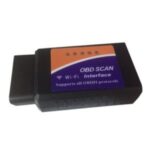Is your Hyundai Elantra’s check engine light illuminated? This indicates a problem that the On-Board Diagnostic (OBD-II) system has detected and logged as a trouble code. Understanding these Hyundai Elantra Obd2 codes can provide valuable insight into your vehicle’s health and potential issues. With an OBD-II scanner, you can retrieve these codes and decipher their meaning. This article provides a comprehensive list of common Hyundai Elantra OBD2 codes and their potential causes.
Common Hyundai Elantra OBD2 Codes and Their Meanings
The following table lists common OBD-II codes that can trigger the check engine light in a Hyundai Elantra. While this list covers a wide range of potential issues, it is not exhaustive.
| Code | Potential Problems |
|---|---|
| P0010 | Powertrain Control Module (PCM) failure, Variable valve timing actuator malfunction, Wiring issue |
| P0011 | Camshaft variable timing solenoid malfunction, Low engine oil, Incorrect engine timing, Non-compliant engine oil, Variable valve timing actuator malfunction, Worn timing chain |
| P0012 | Similar to P0011: Camshaft timing issues |
| P0013 | Similar to P0010: PCM or Variable Valve Timing Issues |
| P0014 | Similar to P0011: Camshaft timing issues |
| P0101 | Vacuum leaks, Damaged intake air boot or PCV hose, Faulty intake manifold gaskets, Mass Airflow Sensor (MAF) issues |
| P0102 | MAF sensor unplugged, damaged wiring, loose or corroded MAF sensor circuit terminals, faulty MAF sensor |
| P0113 | Faulty Intake Air Temperature Sensor, Dirty air filter, Faulty MAF Sensor, Intake Air Temperature Sensor wiring/connection issues |
| P0128 | Faulty engine thermostat, coolant temperature sensor, or intake air temperature sensor, Cooling system issues, Low engine coolant |
| P0135 | Faulty Oxygen Sensor/Air Fuel Ratio Sensor, sensor heater circuit issues, exhaust leaks, intake air leaks, low fuel pressure |
| P0171 | Outdated control module software, Vacuum leaks, Faulty MAF sensor, Fuel filter or pump issues, Dirty fuel injectors |
| P0174 | Similar to P0171: Fuel/Air Mixture Issues |
| P0200 | Faulty fuel injector, wiring/connection issues, clogged fuel injector |
| P0201 | Similar to P0200: Fuel Injector Circuit Malfunction |
| P0202 | Similar to P0200: Fuel Injector Circuit Malfunction |
| P0203 | Fuel injector failure, PCM failure, wiring issues |
| P0205 | Similar to P0203: Fuel Injector Circuit Malfunction |
| P0300 | Worn spark plugs, ignition wires, coils, distributor cap/rotor, incorrect ignition timing, vacuum leaks, low fuel pressure |
| P0301 | Similar to P0300: Misfire in Cylinder 1 |
| P0302 | Similar to P0300: Misfire in Cylinder 2 |
| P0303 | Similar to P0300: Misfire in Cylinder 3 |
| P0304 | Similar to P0300: Misfire in Cylinder 4 |
| P0401 | Restricted EGR passages, faulty EGR valve, insufficient vacuum or electrical signal to EGR valve |
| P0420 | Inefficient catalytic converter, faulty oxygen sensor, engine misfire |
| P0430 | Faulty catalytic converter, Internal Engine Damage |
| P0440 | Missing or faulty fuel cap, Damaged fuel tank filler neck, Evaporative system leaks |
| P0441 | Similar to P0440: Evaporative Emission Control System Incorrect Purge Flow |
| P0442 | Similar to P0440: Evaporative Emission Control System Small Leak Detected |
(The table continues with the remaining codes and their descriptions, following the same format as above. Due to character limitations, the entire table cannot be included here.)
Decoding Hyundai-Specific OBD2 Codes
While generic OBD-II codes apply to all car makes and models, some codes are manufacturer-specific. Codes beginning with “P1” are specific to Hyundai and often require specialized diagnostic equipment for accurate interpretation. Consulting a qualified Hyundai technician is recommended for these codes.
When to Seek Professional Help
If your OBD-II scanner reveals a code you don’t understand or if you suspect a complex issue, it’s always best to consult a certified Hyundai technician. They possess the expertise and tools to diagnose and repair your Elantra correctly.
